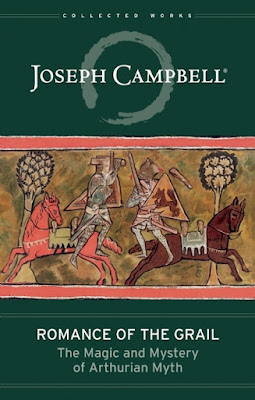Joseph Campbell was a professor of literature at Sarah Lawrence College, and wrote extensively about comparative mythology. His "hero's journey" theory has been extremely influential.
This book is a collection of his lectures and writings on the Arthurian adventures and Grail Quests of the Middle Ages, specifically the "Matter of Britain" stories of the 12th and 13th centuries. These are the stories, or the basis of the stories, of Arthur's court and its knights and ladies that we are most familiar with, and have nothing to do with the probable historical Arthur figure of the late 5th/early 6th centuries who may have led the Celtic Britons in resistance against the invading Saxons. If the historical Arthur existed, Arthur would have most likely been a nickname or title, not his name.
And that's not the Arthur Campbell was interested in. He was in it for the mythology, the fantastical adventures, the stories of the Grail, the Fisher King, the Dolorous Stroke, Tristan and Isolde. He makes it fascinating.
In these lectures, essays, and his previously unpublished master's thesis, "A Study of the Dolorous Stroke," he traces the origins of these myths and legends, the sources in Celtic mythology, influences from Greek, Islamic, and Indian myths and poetry, and the transition from originally religious mythology to perhaps the first secular mythology, influencing and influenced by the emerging customs of courtly love.
That Greek mythology would have influenced European poetry and story-telling is of course just a given. Islamic influence is also not very surprising, given that much of Spain was occupied by Muslims who had conquered the territory. I was initially quite startled by the idea of Indian influence. That seemed a reach--until I reminded myself of the Silk Road and the trade and communication between Muslims in Europe and the Middle East, and Muslims in India. The contributions to one of the most popular, influential, and lasting story cycles of Europe was truly not just international, but from the entire Eurasian world. That's part of why we see repeated themes told differently, including the "dolorous stroke" that wounded the Fisher King and made his kingdom a wasteland until the true and proper knight arrived to set things right, occurring several different times, with kings of different names. And while the "dolorous stroke" is most often from a spear, sometimes it's a sword.
There are even echoes of some of the Arthurian themes in African stories from cultures distant enough to wonder if this is influence, or an underlying theme arising in more than one culture.
It's interesting, complex, not always an easy read, but well worth the time and the effort. Highly recommended.
I received a copy of this book as a gift, and am reviewing it voluntarily.

No comments:
Post a Comment